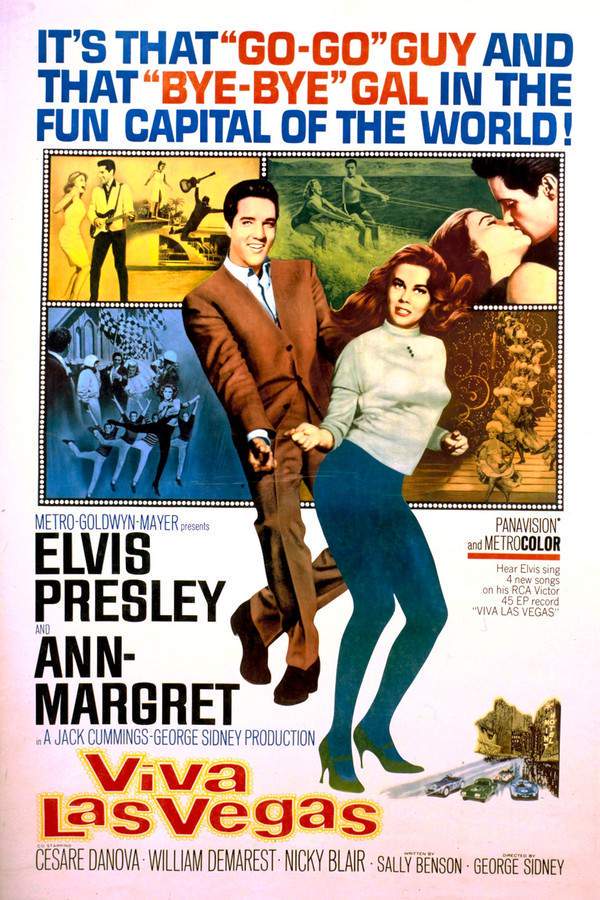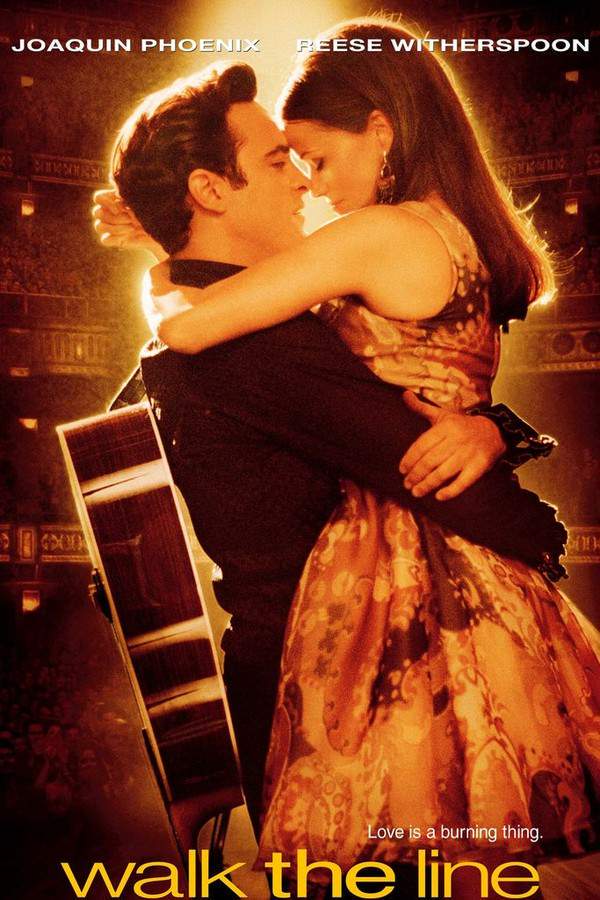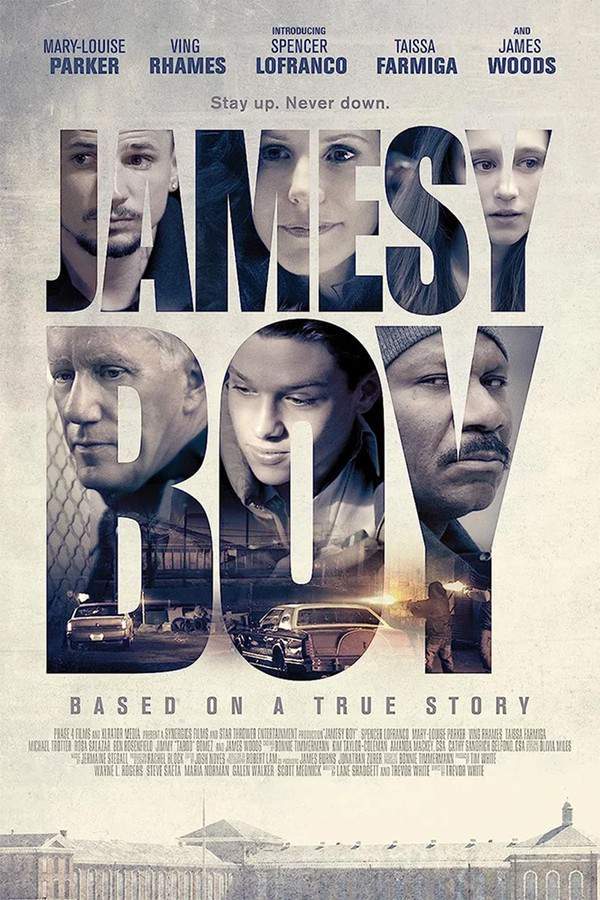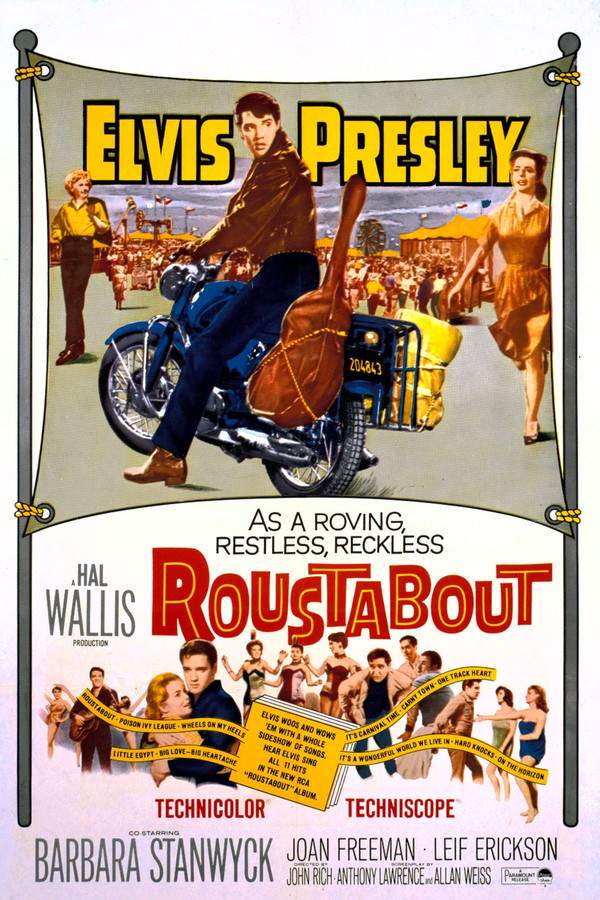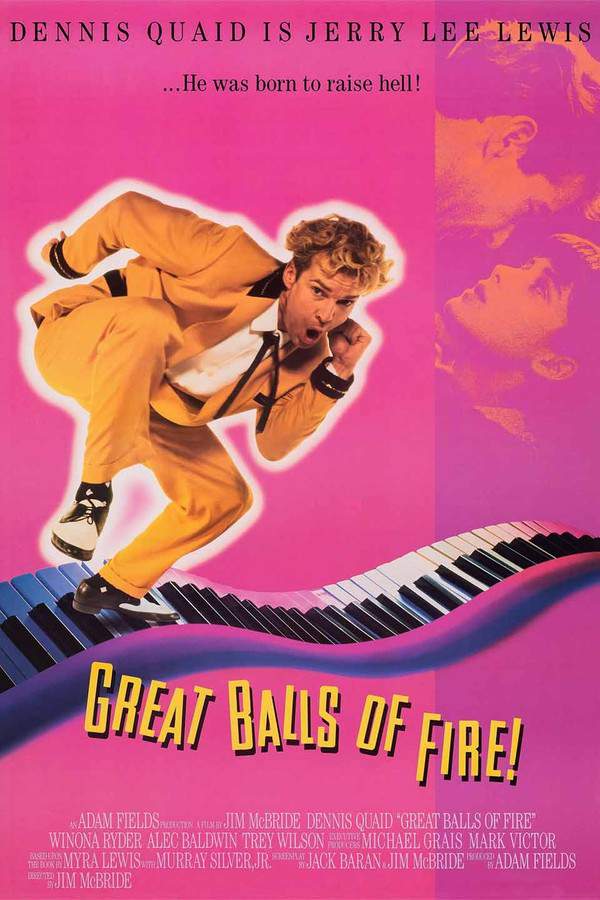
Jailhouse Rock 1957
Directed by

Richard Thorpe
Made by
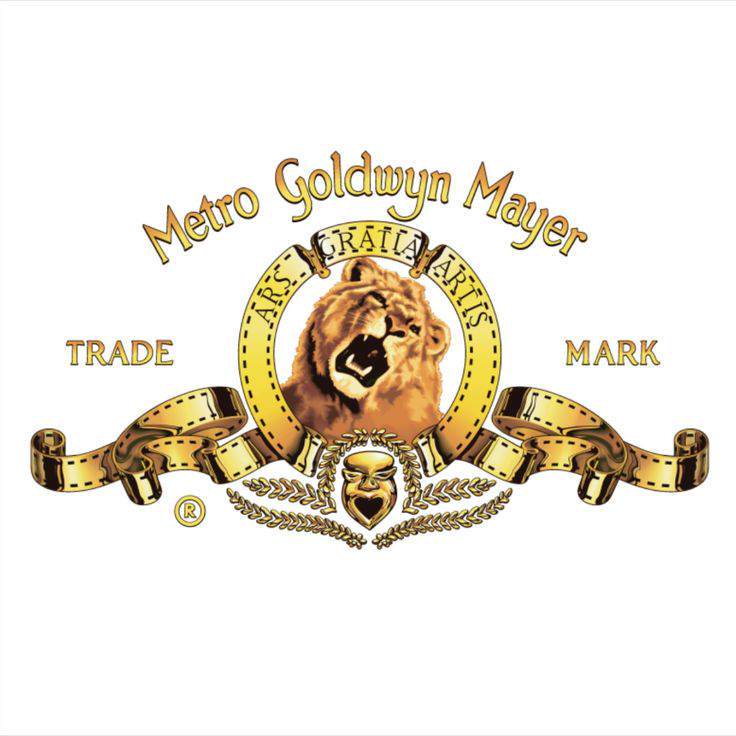
Metro-Goldwyn-Mayer (MGM)
Test your knowledge of Jailhouse Rock with our quiz!
Jailhouse Rock Plot Summary
Read the complete plot summary and ending explained for Jailhouse Rock (1957). From turning points to emotional moments, uncover what really happened and why it matters.
Vince Everett, portrayed by Elvis Presley, is a young, 19-year-old construction worker who seeks a respite from his demanding day by visiting a local bar for a drink. However, things take a turn when a drunk man recklessly splashes his drink onto Vince’s face, leading to an unexpected brawl. In the heat of the moment, Vince inadvertently kills the man while defending himself.
This encounter leads to Vince’s arrest and subsequent sentencing to serve a term of one to ten years for manslaughter. Inside the state penitentiary, he finds himself alongside a seasoned inmate named Hunk Houghton, played by Mickey Shaughnessy, a once-famous country music singer now serving time for armed robbery. Recognizing Vince’s potential, Hunk begins to mentor him in guitar playing and encourages him to shine in an upcoming inmate talent show that’s expected to be broadcast across the nation.
Due to his newfound fame, Vince attracts a flood of fan mail, though Hunk makes sure to keep it hidden from him. To the surprise of Vince, Hunk later persuades him to enter into a partnership for their music act. Yet, the path to success is fraught with challenges. After retaliating during an inmate riot, Vince faces harsh punishment, while Hunk’s attempts to bribe the guards go unheeded.
After a period of 14 months, Vince is paroled for good behavior, and the warden presents him with the fan mail, revealing Hunk’s intent to protect him from the pressures of fame. Hunk promises Vince a job as a singer at a nightclub, setting the stage for his return to the outside world.
Upon his release, Vince finds himself living in a modest flophouse, and soon heads to the nightclub, only to be disappointed by the club owner’s refusal to hire him as a singer. Instead, he is offered a busboy position. While working, he encounters Judy Tyler, a young promoter named Peggy Van Alden, who encourages Vince to take the stage. During an impromptu performance, Vince’s anger peaks when he feels disrespected by an unruly customer, leading him to smash his guitar in frustration and leave the venue.
Peggy, however, believes in Vince’s talent and persuades him to record a demo to help him assess his singing ability. With her assistance, he records “Don’t Leave Me Now,” which Peggy presents to Geneva Records. The initial response is lackluster, but when she informs him that the song has been sold, Vince’s dreams take a hit. An awkward dinner party reveals tensions between Vince and Peggy, culminating in a heated kiss when she confronts him.
Weeks roll by, and dismay strikes when Vince discovers that Mickey Alba’s version of his song has been released instead, with no credit given to him. Angry yet determined, Vince suggests forming their own label, Laurel Records, with the aid of attorney Vaughn Taylor. After recording “Treat Me Nice,” they face universal rejection. However, with Peggy’s networking, they secure airplay for the song from disc jockey Dean Jones, propelling it to success.
Later on, amidst rising fame, Vince invites Peggy for a celebratory dinner but is disheartened to learn of her date with Teddy. His increasing popularity lands him an invitation to perform on a television variety show in New York, a stage that proves pivotal in his career. Just when everything seems to fall into place, Hunk’s appearance after his own release adds tension, revealing the rift between Vince’s success and the sacrifices of his friend.
As success turns Vince into a self-centered celebrity, his relationship with Peggy becomes strained. Hunk’s persistent dissatisfaction culminates in a confrontation that leaves Vince physically vulnerable and potentially jeopardizing his career. In a moment of reflection, Vince arrives at the realization that he deeply loves Peggy, who reciprocates his feelings.
In the end, after a period of healing and reassessment, Vince sings “Young and Beautiful” for Peggy, finally feeling secure enough in his vocal ability and in his relationship with her. Their journey together progresses toward a hopeful future, marking the transformation of a once-troubled young man into a devoted artist and partner.
Jailhouse Rock Timeline
Follow the complete movie timeline of Jailhouse Rock (1957) with every major event in chronological order. Great for understanding complex plots and story progression.
Bar Fight
Vince Everett, a young construction worker, seeks a drink at a local bar to unwind after a taxing day. Unfortunately, a drunken patron accidentally spills a drink on him, igniting a violent brawl that ends with Vince fatally injuring the man in self-defense.
Arrest and Sentencing
Following the bar incident, Vince is arrested and charged with manslaughter. He faces the gravity of his actions in court and is sentenced to serve a term of one to ten years in a state penitentiary, drastically altering the course of his life.
In Prison
Inside the prison, Vince meets Hunk Houghton, a seasoned inmate who once enjoyed fame as a country music singer. Hunk recognizes Vince's potential and takes him under his wing, teaching him to play the guitar and encouraging him to participate in the upcoming inmate talent show.
Fan Mail and Mentorship
As Vince gains recognition for his musical talents in prison, he starts receiving fan mail. Hunk, wishing to protect Vince from the pressures of fame, decides to keep the letters hidden while continuing to mentor him in preparation for their performance.
Inmate Riot
A violent riot breaks out among the inmates, and Vince finds himself involved. His instincts compel him to retaliate, leading to severe punishment that tests his resolve and determination to succeed in the music world.
Parole
After serving 14 months for good behavior, Vince is paroled from the penitentiary. Upon his release, the warden gives him the fan mail, revealing Hunk's intention to shield him from outside pressures while promising him a job as a singer.
Return to Reality
Once outside, Vince settles into a humble flophouse but quickly heads to the nightclub where he hopes to start his singing career. Disappointment ensues when the club owner offers him only a busboy position instead of the singing job he desires.
Impromptu Performance
While working as a busboy, Vince meets Peggy, a young promoter who encourages him to take the stage. Frustrated by a disrespectful patron, Vince erupts and shatters his guitar on stage, leaving the venue in anger and disappointment.
Recording a Demo
Believing in his talent, Peggy persuades Vince to record a demo. Together, they record the song 'Don't Leave Me Now' and present it to Geneva Records, hoping for a breakthrough in Vince's music career.
Initial Rejections
Initially met with a lukewarm response, the song's lack of immediate success discourages Vince. However, his spirits dampen further when he learns that another artist, Mickey Alba, has released a version of his song without crediting him.
Forming Laurel Records
Determined to reclaim his rights, Vince suggests creating their own label, Laurel Records, with assistance from an attorney. Despite initial setbacks with their first recording 'Treat Me Nice' receiving universal rejection, they persevere.
Facing Success
With Peggy’s networking efforts, the song finally receives airplay from disc jockey Dean Jones, leading to a surge in popularity. This newfound success brings Vince closer to the spotlight he has longed for, moving him up the music industry ladder.
Television Appearance
Vince's growing fame grants him an invitation to perform on a prestigious television variety show in New York. This moment becomes a pivotal point in his career, solidifying his status as an emerging artist.
Strained Relationships
As Vince’s stardom rises, the dynamics with Peggy and Hunk shift, leading to tension and misunderstandings. The arrival of Hunk after his release further complicates issues, as Vince must confront the sacrifices made by his friend.
Declaration of Love
Amidst the turmoil, Vince realizes his true feelings for Peggy and confesses his love. This revelation leads to healing and reconciliation, culminating in Vince performing 'Young and Beautiful' for her, marking his transformation as both an artist and a loving partner.
Jailhouse Rock Characters
Explore all characters from Jailhouse Rock (1957). Get detailed profiles with their roles, arcs, and key relationships explained.
Vince Everett (Elvis Presley)
Vince is a young, impulsive construction worker whose life takes a drastic turn after a tragic incident leads to his imprisonment. He evolves from a troubled youth into a passionate musician seeking redemption and success. Vince's character arc illustrates his struggles with fame, personal relationships, and self-acceptance as he navigates the complexities of the music industry.
Hunk Houghton (Mickey Shaughnessy)
Hunk is a seasoned inmate and mentor to Vince, offering him guidance and support during their time in prison. Once a renowned country music singer, he embodies the trials of lost fame and hopes to see Vince succeed where he could not. Hunk's character serves as both a motivator and a cautionary figure, representing the sacrifices made for success in a harsh environment.
Peggy Van Alden (Judy Tyler)
Peggy is a young promoter who discovers Vince's talent and encourages him to pursue his dreams, acting as both a supportive friend and a love interest. Her ambitions and determination play a crucial role in Vince's rise to fame. Peggy’s character balances both professionalism and personal connection, showcasing the complexities of relationships in the backdrop of the entertainment industry.
Attorney (Vaughn Taylor)
The attorney is a pivotal character who aids Vince in establishing his own record label, representing the business side of his music career. He symbolizes the legal complexities artists face and the importance of having proper guidance in the industry. His character adds depth to the narrative by illustrating the intersection of art and law.
Disc Jockey (Dean Jones)
The disc jockey plays a significant role in Vince's career resurgence, helping to propel his music to a wider audience. His character represents culture's evolving relationship with music broadcasting and the pivotal role media plays in an artist's success. His support is a symbol of the connections that can be built within the industry.
Jailhouse Rock Settings
Learn where and when Jailhouse Rock (1957) takes place. Explore the film’s settings, era, and how they shape the narrative.
Time period
The film unfolds during the mid-20th century, reflecting the cultural landscape of music and celebrity during that era. This period is characterized by a burgeoning interest in rock and roll, as well as the rise of television as a platform for music artists. The societal attitudes towards crime and rehabilitation are also prevalent themes, shaping the backdrop of Vince's journey.
Location
State Penitentiary, Nightclub, Flophouse, New York
The State Penitentiary serves as the primary setting where Vince transforms from an inmate to a rising star, learning the ropes of music from Hunk. The nightclub symbolizes Vince's aspirations and struggles in the music industry, where he faces both rejection and opportunity. The flophouse represents his initial struggles post-incarceration, serving as a physical manifestation of his challenges in reintegrating into society. New York represents the broader stage of fame and talent, where Vince's career ultimately takes flight.
Jailhouse Rock Themes
Discover the main themes in Jailhouse Rock (1957). Analyze the deeper meanings, emotional layers, and social commentary behind the film.
🎶
Redemption
The theme of redemption is central to Vince's story, as he navigates the consequences of his actions after his manslaughter conviction. His journey from inmate to celebrated musician highlights the possibility of personal growth and transformation. Through mentorship and support from Hunk and Peggy, Vince learns to confront his past and embrace his newfound identity, illustrating the power of second chances.
❤️
Love
Love plays a significant role in Vince's life, particularly in his relationship with Peggy. Their connection evolves throughout the film, showcasing the challenges that come with ambition and fame. Ultimately, love becomes a source of strength for Vince, motivating him to rekindle his relationship with Peggy and inspiring his musical performances.
🎸
Music
Music serves as both a catalyst for transformation and a means of escape for Vince. From the confines of the prison to the bustling nightclub stage, music represents not only his passion but also his journey towards self-identity. The film emphasizes the power of music to connect people and express deep emotions, as Vince learns to channel his struggles into his art.

Coming soon on iOS and Android
The Plot Explained Mobile App
From blockbusters to hidden gems — dive into movie stories anytime, anywhere. Save your favorites, discover plots faster, and never miss a twist again.
Sign up to be the first to know when we launch. Your email stays private — always.
Jailhouse Rock Spoiler-Free Summary
Discover the spoiler-free summary of Jailhouse Rock (1957). Get a concise overview without any spoilers.
In a world where the clang of steel bars meets the echo of a lone guitar, a restless young man named Vince Everett finds his future humming in an unexpected place. Seeking a brief escape from the grind of daily labor, his life takes a sharp turn that lands him inside a state penitentiary—a stark, institutional backdrop that oddly serves as a crucible for hidden talent. The prison’s walls, while imposing, also reverberate with the whispers of a bygone music scene, setting a tone that blends gritty realism with a restless, hopeful rhythm.
Within those confines, Hunk Houghton—a seasoned performer whose own fame has dimmed behind a sentence—recognizes the raw spark in Vince’s voice. Their unlikely partnership transforms the cell block into a rehearsal space, where mentorship and music intertwine, offering a glimpse of redemption through song. The atmosphere is charged with a blend of camaraderie and competition, hinting at the transformative power of art in even the most unforgiving settings. This dynamic shapes Vince’s identity, suggesting that the path to stardom can begin in the most unlikely of arenas.
Upon his release, Vince steps back into a world pulsing with the promise of a burgeoning entertainment industry. It is there he encounters Peggy Van Alden, a sharp‑witted record executive who perceives the raw potential humming beneath his rough exterior. Their meeting hints at a partnership that could amplify his voice far beyond the prison walls, while also exposing him to the dazzling yet demanding spotlight of fame. The film balances the raw, blue‑collar roots of its protagonist with the glimmering allure of show business, inviting viewers to wonder how far a voice raised in confinement can travel when guided by ambition, mentorship, and a touch of destiny.
Can’t find your movie? Request a summary here.
Movies with Similar Twists and Themes
Uncover films that echo the narrative beats, emotional arcs, or dramatic twists of the one you're exploring. These recommendations are handpicked based on story depth, thematic resonance, and spoiler-worthy moments — perfect for fans who crave more of the same intrigue.
Featured on this page

What's After the Movie?
Not sure whether to stay after the credits? Find out!
Explore Our Movie Platform
New Movie Releases (2026)
Famous Movie Actors
Top Film Production Studios
Movie Plot Summaries & Endings
Major Movie Awards & Winners
Best Concert Films & Music Documentaries
Movie Collections and Curated Lists
© 2026 What's After the Movie. All rights reserved.


